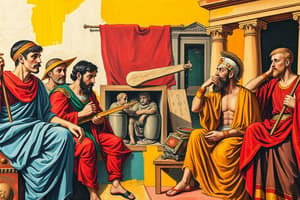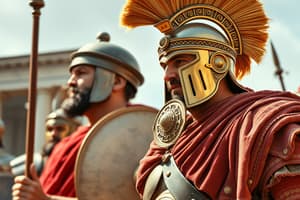Podcast
Questions and Answers
What was Spartacus's occupation before becoming a gladiator?
What was Spartacus's occupation before becoming a gladiator?
- Roman senator
- Roman soldier (correct)
- Thracian king
- Slave trader
Where did Spartacus and his fellow gladiators escape from?
Where did Spartacus and his fellow gladiators escape from?
- Rome
- Capua (correct)
- Sicily
- Thrace
How many rebels were crucified along the Appian Way after the rebellion was suppressed?
How many rebels were crucified along the Appian Way after the rebellion was suppressed?
- 10,000
- 7,000
- 5,000
- 6,000 (correct)
Who was tasked with suppressing the rebellion sparked by Spartacus?
Who was tasked with suppressing the rebellion sparked by Spartacus?
What was the approximate number of enslaved people and others who joined Spartacus's forces?
What was the approximate number of enslaved people and others who joined Spartacus's forces?
What is the nationality of Spartacus according to historical sources?
What is the nationality of Spartacus according to historical sources?
What was Spartacus's occupation before becoming a gladiator?
What was Spartacus's occupation before becoming a gladiator?
Who described the Third Servile War as 'the only just war in history'?
Who described the Third Servile War as 'the only just war in history'?
What is a notable feature of the sources on Spartacus?
What is a notable feature of the sources on Spartacus?
Who is Spartacus likened to due to his revolutionary movements?
Who is Spartacus likened to due to his revolutionary movements?
Flashcards are hidden until you start studying
Study Notes
Spartacus' Life and Revolt
- Spartacus was a Thracian gladiator who led a major slave uprising against the Roman Republic in the Third Servile War.
- He was born around 103 BC and died in 71 BC.
- Spartacus was a former soldier who served with the Romans before being enslaved and becoming a gladiator.
- He escaped from a gladiatorial school near Capua with around 70 other gladiators, starting the slave revolt in 73 BC.
The Revolt
- Spartacus' forces defeated several Roman military units, growing to an estimated 70,000 enslaved people and others.
- Despite lack of formal military training, Spartacus proved himself a capable tactician.
- The rebellion posed a significant challenge to Roman authority, prompting a series of military campaigns against it.
Spartacus' Defeat and Legacy
- Spartacus was presumed killed in the final battle in 71 BC, although his body was never found.
- The aftermath of the rebellion saw the crucifixion of 6,000 surviving rebels along the Appian Way.
- Spartacus' legacy has endured, inspiring cultural works and becoming a symbol for resistance and revolutionary movements.
Historical Sources
- The primary sources of Spartacus' life come from Plutarch and Appian, who wrote more than a century after his death.
- Plutarch's Life of Crassus and Appian's Civil Wars provide the most comprehensive details of the slave revolt.
- No contemporary sources exist, and all accounts were written by those not directly involved, significantly later, and without perspectives from slaves or eyewitnesses.
Studying That Suits You
Use AI to generate personalized quizzes and flashcards to suit your learning preferences.



